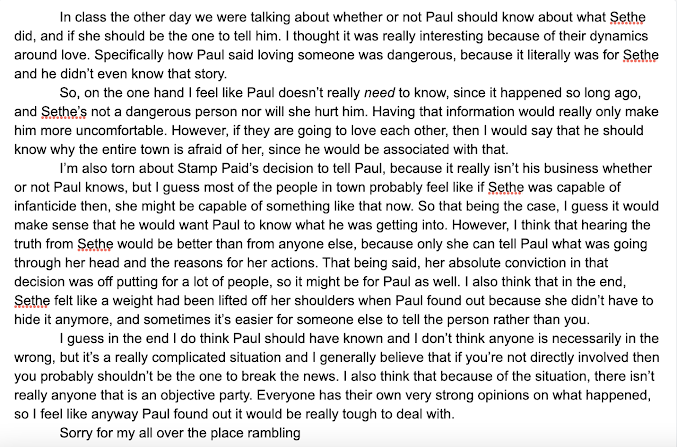The narrator's mentors
Throughout the course of the novel, there have been several characters that impact the narrator’s perspective and in some cases, course of action. Each of them acts as a mentorish figure in a very different way. The first example we get to know is Dr. Bledsoe who the narrator idolizes for his success. The narrator looks up to his power and high reputation. However, the narrator does not really understand Bledsoe’s dog-eat-dog work mentality until he stabs the narrator in the back by kicking him out of the school without telling him. Up until that point, he thought that Bledsoe’s intentions were more focused on helping black people succeed rather than bringing only himself up, even at the expense of other black people. When the narrator moves all the way to New York and realizes what Bledsoe has done, he becomes deeply angry and carries that anger and loss of innocence with him for the rest of the book.
The veteran is someone that could be considered one of these mentor figures, however the narrator wasn’t really ready to understand the veteran’s mentality when they met each other, so it seems debatable. However, I think the narrator at the time of recollecting his encounter understands the vet’s ideology more, and we can see him start to resist authority more later on in the book.
The third person that really impacts the narrator is Brockway at the paint factory. He’s such a curmudgeon, yet he believes wholeheartedly in the company he works for to a point where he doesn’t see that he’s being mistreated. The narrator sees this, and I think see himself in Brockway. It’s interesting how the veteran accused the narrator of being the same way, and he didn’t really understand it, but I think working with Brockway showed off the veteran’s point, and he realizes it. At first he is happy to work under Brockway but then learns more and more about his absolute blind following for the company and becomes angry.
The last person we’ve really seen mentor the narrator at this point is Mary. The way she trusts him, and roots for him even when he can’t pay her for a room, is a positive relationship that the narrator hasn’t had in a while. She doesn’t expect the narrator to be anything other than himself, and I could sense a maternal feeling towards him. However, when the narrator finds the coin bank, he loses all the appreciation for Mary he had. He views it as self-loathing and a disgusting way of submitting to white people. Like with almost all of the other people I’ve mentioned he ends the relationship in anger.

Great post! I think it'd also be interesting to consider Brother Jack in the 'mentor' light you're examining here. While he's definitely not a mentor in that the narrator never looked up to him, he still is a power of authority that shapes the narrator. And, like you said, the narrator definitely constantly leaves Jack angry with him. It makes me feel like no matter how hard the narrator tries, he's always kind of less of an authority figure and more submissive than he wants to be.
ReplyDeleteI think this is a really good way of tracking the narrator's growth over the course of the book. The people who are around him change so much from the beginning to the end, and his personal goals change so much, that I think the people he admires at any given time are a really good indicator of how he is feeling about certain issues and where he is at.
ReplyDeleteIt's interesting to see how each of the mentors help him develop consciousness about who he is. Bledsoe, Brockway, and Jack could even be described as anti-mentors, in a way—once the narrator sees their flaws, he does the opposite of the examples they set for him. Each mentor brings him a step further to becoming self-autonomous and developing his identity, rather than submissively trying to appeal to authority figures.
ReplyDeleteYou know I agree about the Vet as maybe THE most important mentor figure in the novel, as we see the basement narrator at the end of the book as embracing the kind of invisibility that enables the Vet to speak his mind freely with no fear of social retribution. We might call him an "anti-mentor," or some formulation that reflects the irony of him playing this role: on paper, he's the opposite of what the narrator thinks he wants, a "victim" of the system and a cautionary tale for what the narrator would want to avoid. But as the novel goes on, we see him almost unconsciously get closer and closer to a Vet-inspired view of the world--even though he doesn't seem to realize this, and he never gives the Vet "credit" for this inspiration.
ReplyDeleteI think it's cool how the narrator's mentors impacted him throughout the story, and how the acquisition of more knowledge and experience on the narrator's end affects the way the prior words and actions of his earlier mentors is perceived. I'm glad you pointed that out. It's also interesting to see the stark differences between his four mentor figures, in terms of mental state, living quality, employment, etc.
ReplyDelete